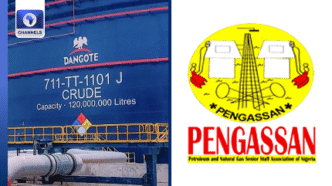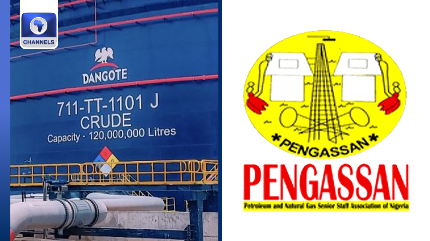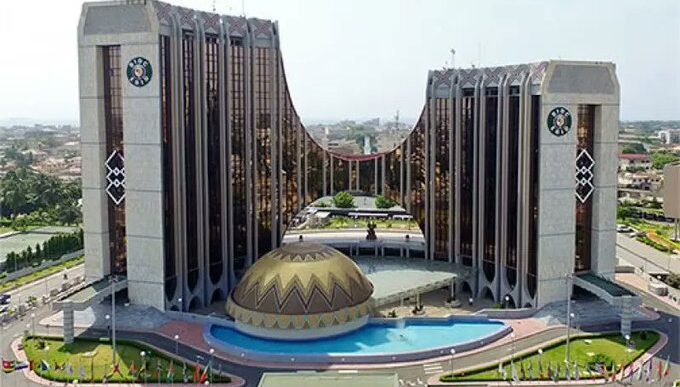The Federal Government on Wednesday announced the suspension of the nationwide strike action by the Petroleum and Natural Gas Senior Staff Association of Nigeria (PENGASSAN), bringing an end to the dispute between the association and the Dangote Refinery.
The Minister of Labour and Employment, Dr. Mohammed Maigari Dingyadi, disclosed this in an early morning statement, confirming that an agreement had been reached after marathon negotiations between government officials, PENGASSAN leaders, and the management of Dangote Industries Limited.
The breakthrough marks a significant relief for the oil and gas sector, which had been facing disruption risks after PENGASSAN shut down operations at the $20 billion Dangote Refinery and its fertilizer plant earlier this week.
Federal Government Confirms Peace Deal
According to Minister Dingyadi, the resolution followed “constructive dialogue” facilitated by the Ministry of Labour and Employment, with the active involvement of the Ministry of Petroleum Resources and other stakeholders in the energy sector.
“We are pleased to inform Nigerians that the industrial dispute between PENGASSAN and the management of Dangote Refinery has been amicably resolved. As a result, the union has called off its strike, and normalcy will return to operations with immediate effect,” the minister said.
Dingyadi commended both sides for showing maturity and patriotism, stressing that the resolution was in the national interest given the strategic importance of the refinery to Nigeria’s energy security.
The Federal Government has said the Dangote Group will redeploy staff earlier disengaged from its refinery operations, following the resolution of its dispute with the Petroleum and Natural Gas Senior Staff Association of Nigeria.
The FG also announced that the redeployed staff will not suffer any loss of pay due to the redeployment.
The Dispute: What Triggered the Strike?
The crisis began when PENGASSAN accused the Dangote Refinery management of unfair labour practices, including poor working conditions, wage disparities, and alleged attempts to weaken union activities at the facility.
In response, PENGASSAN declared an indefinite strike on Sunday, shutting down the refinery’s operations completely while partially halting fertilizer production.
The shutdown raised alarm nationwide, as the Dangote Refinery—Africa’s largest single-train facility—is considered a critical project for Nigeria’s energy independence. The refinery has been projected to end Nigeria’s reliance on imported petroleum products and stabilize fuel supply.
The strike also threatened to worsen the already fragile economic situation, with fears of fuel scarcity, job losses, and revenue disruptions.
Negotiations Behind Closed Doors
Government intervention was swift. By Monday, the Ministry of Labour summoned both parties to an emergency meeting in Abuja. The talks, which stretched late into Tuesday night, involved representatives of PENGASSAN, Dangote Refinery management, and senior government officials.
Sources familiar with the negotiations revealed that key sticking points included recognition of workers’ rights to unionize, wage harmonization, and assurances of safe and fair working conditions at the refinery complex.
While details of the final agreement have not been made public, both sides reportedly made concessions. The refinery management agreed to review wage structures and address safety concerns, while PENGASSAN consented to suspend its industrial action in good faith.
Relief for Nigeria’s Oil and Gas Sector
The end of the strike has been greeted with relief by stakeholders across the energy industry. Analysts had warned that prolonged disruption could delay the refinery’s operations and derail Nigeria’s efforts to stabilize its downstream petroleum market.
With the refinery’s full-scale operations expected to transform Nigeria from a net importer to a net exporter of refined products, stability in its workforce is seen as essential.
Dr. Hassan Bamidele, an energy economist, noted:
“This resolution is a major relief. The Dangote Refinery is too strategic to Nigeria’s economy to be caught in prolonged industrial disputes. Government must ensure that the terms of agreement are fully implemented to prevent future breakdowns.”
PENGASSAN Reacts: Workers’ Welfare Non-Negotiable
In its reaction, PENGASSAN confirmed the suspension of the strike but emphasized that workers’ welfare remains at the heart of its struggle.
A statement from the union’s national leadership said:
“We have agreed to suspend the strike following assurances from the Federal Government and management of Dangote Refinery that our demands will be met. However, we will not hesitate to resume industrial action if these commitments are not honored. Workers’ rights and welfare are not negotiable.”
The union added that it will continue to monitor the situation closely, stressing that fairness and respect for collective bargaining are essential for industrial harmony.
Dangote Refinery Management: “We Remain Committed”
The Dangote Group, in a brief statement, welcomed the resolution and pledged to work closely with the union to maintain stability.
“As an organization, we are committed to maintaining the highest standards of corporate governance, employee welfare, and operational excellence. The resolution reached is a testament to our shared commitment to the success of the refinery project and the progress of Nigeria,” the statement read.
Broader Implications for Labour Relations in Nigeria
The PENGASSAN-Dangote standoff has underscored the critical role of labour unions in shaping industrial relations within Nigeria’s private sector. While public-sector strikes are frequent in Nigeria, large-scale disputes involving mega private projects such as the Dangote Refinery are less common.
Labour analysts say the quick resolution highlights the government’s awareness of the refinery’s strategic importance. They also warn that stronger mechanisms for dispute prevention are needed to avoid similar crises in the future.
Political and Economic Impact
For President Bola Tinubu’s administration, which is already grappling with economic challenges, the resolution comes as a welcome reprieve. A prolonged strike could have undermined the government’s economic reform narrative and triggered widespread public frustration.
It also reassures foreign investors watching Nigeria’s handling of industrial disputes in major projects. Stability at the Dangote Refinery is particularly important for investor confidence in the country’s energy and infrastructure sectors.
Conclusion: A Fragile Peace, But a Vital One
The calling off of the PENGASSAN strike and the resolution of its dispute with the Dangote Refinery represent a victory for dialogue and compromise. However, the truce remains fragile, dependent on full implementation of the commitments made during negotiations.
For Nigeria, the development underscores both the challenges and opportunities of managing industrial relations in a changing economy. With the Dangote Refinery expected to play a transformative role in the country’s energy future, ensuring sustained harmony between workers and management will be essential.
As operations resume at the refinery, Nigerians will be watching closely to see if this peace endures—or if another round of labour unrest looms on the horizon.














